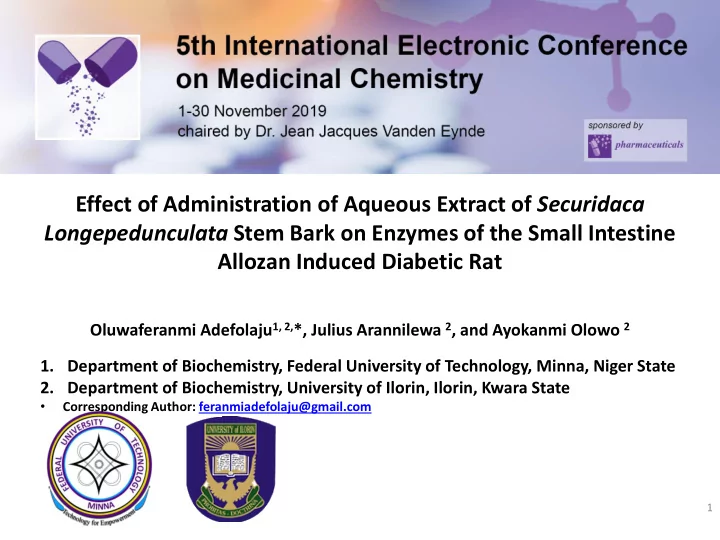

Effect of Administration of Aqueous Extract of Securidaca Longepedunculata Stem Bark on Enzymes of the Small Intestine Allozan Induced Diabetic Rat Oluwaferanmi Adefolaju 1, 2, *, Julius Arannilewa 2 , and Ayokanmi Olowo 2 1. Department of Biochemistry, Federal University of Technology, Minna, Niger State 2. Department of Biochemistry, University of Ilorin, Ilorin, Kwara State • Corresponding Author: feranmiadefolaju@gmail.com 1
Effect of Administration of Aqueous Extract of Securidaca Longepedunculata Stem Bark on Enzymes of the Small Intestine Allozan Induced Diabetic Rat 2
ABSTRACT: The stem barks of Securidaca longepedunculata are used traditionally across Africa for the treatment of diabetes, cancer, metabolic diseases and asthma. This study was aimed at investigating the potential enzyme activities of the S. longepedunculata on the small intestine. Aqueous extracts of S. longepedunculata were tested in vivo on animal models: A total of 12 Wister rats were assigned into four (I – IV) groups of three animals each. Group I served as the control and was administered 0.5mL of distilled water. Groups II – IV were given 0.5, 1 and 2mg/kg body weight of S. longepedunculata stem bark extracts. The activities of the following enzymes, Alanine transaminase (ALT), Lactate dehydrogenase (LDH), Alkaline phosphatase (ALP), Aspartate transaminase (AST), were assayed in the small intestine. The result revealed a significant reduction in ALP and LDH. This gives an indication that the administration of aqueous extract of securidaca longepedunculata can elicit detrimental effect in the small intestine of the albino rat. Also the result obtained in the qualitative analysis shows the presence of phytochemicals such as: saponin, flavonoid and terpernoid. Keywords: Intestinal drug Absorption; Drug-Enzyme Interaction; Natural Product; Phytochemistry. 3
Introduction Medicinal plants and its increasing usage have been previously reported for its therapeutic value in treatment of varieties of ailment. World Health Organization (WHO) emphasized this, when it defined medicinal plants as that, which can be used as infusion or decoction (WHO, 1997) Securidaca longepedunculata have shown promising therapeutic potentials such as antimicrobial and antioxidant properties (Da Costa et al ., 2013). Series of public health concerns and apprehensions such poor understanding of drug and enzyme interaction surrounding its safety have also been progressively documented (Elvin-Lewis, 2001; Raynor et al. , 2011) . Hence, the need to investigates the effect of S. longepedunculata aqueous extract on the enzyme activities of the small intestine, with reference to Allozan induced diabetic mellitus disease condition in animal models. 4
Results and discussion 180 160 140 Enzyme activities Assayed 120 100 ALP 80 LDH AST 60 ALT 40 20 0 Distilled water 0.5 1 2 Concentration of Aqueous extract in (mg/kg) 5 5
RESULTS AND DISCUSSION The enzymes were selected based on their specific location in the cell (Malomo, 2000; Yakubu et al ., 2003). There is a significant difference in ALP, LDH and ALT activity. Any significant difference in enzyme activity may be as a result of toxicity, presumably by leakage through altered cell membrane (Akanji and Ngaha, 1989). The significant reduction in LDH activity is quite understandable since it is in close proximity to the plasma membrane. The non-significant activity in AST may be due to non-toxicity of the extract in the Rat small intestine (Shahjahan et al ., 2004). Saponin complexes the cholesterol in the plasma membrane which can cause a reduction in the activity of ALP (Xu et al ., 1996). The corresponding increase in ALP activity confirmed that damage has been inflicted on the plasma membrane, which might have resulted in the compromise of its integrity. 6 6
CONCLUSIONS The result of this study showed that the activity of majority of the enzyme assayed (ALP, LDH, and ALT) were decreased. This reflects that, there may be some potentially toxic compounds present in the extract that are deleterious to the normal functions of the small intestine. Hence, the extract may not be safe for medicinal purposes attributed to it, unless when properly processed. 7 7
ACKNOWLEDGMENTS Thank you for the Audience. 8 8
Recommend
More recommend